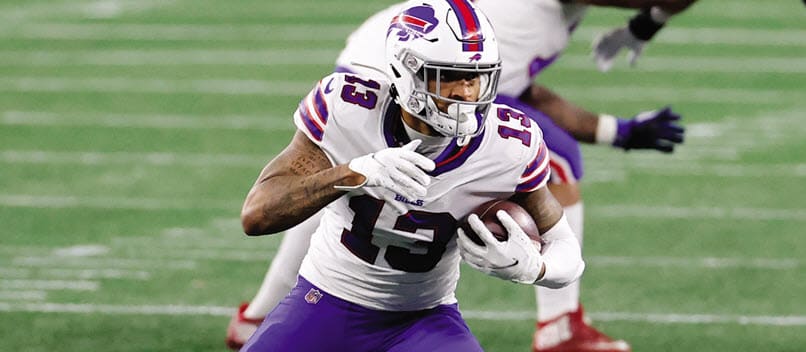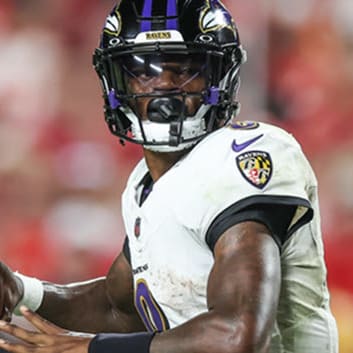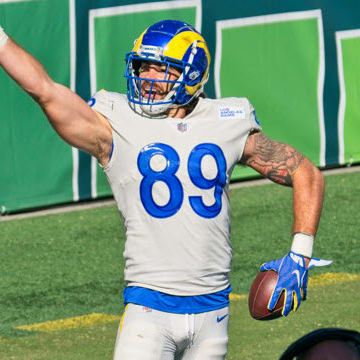This article is part of our Dynasty Strategy series.
The 2020 wide receiver class was among the best going back a number of years, and an expansive list of potential stars were expected from it. Gabriel Davis was generally not among the names of those keeping that list, with the conventional assessment grading him as a mid-round prospect out of UCF. Following a historic four-touchdown game against the Chiefs in the NFL's 2021 divisional playoff round, Davis' place in the NFL is under close reexamination as fantasy players and league observers generally scramble to figure out how this 22-year-old former fourth-round pick and presumed Buffalo WR4 managed to make such a noteworthy mark in NFL playoff history.
INTEL
College Production
Davis stood out for all of his three collegiate seasons and served as the Golden Knights' WR1 in two, establishing strong production by any standard and even more so when considering his age in each season. Davis played at an age disadvantage and still had no trouble maintaining high efficiency even while in a workhorse wide receiver role. In Davis' 25 active games from 2018 to 2019 UCF completed 58.4 percent of its passes at 8.8 yards per attempt, throwing 63 touchdowns. Davis caught 125 of 222 targets for 2,056 yards and 19 touchdowns, providing UCF with 28.6 percent of its receiving yardage and 30.2 percent of its passing touchdowns on 27.1 percent of its targets. His catch rate of 56.3 percent was slightly below that team catch rate of 58.4, but the surplus in yardage per target more than offsets that. Whereas UCF averaged 8.8 yards per attempt, Davis averaged 9.3 yards per target .The UCF passing game was highly effective, and Davis was the force driving it both in terms of volume and efficiency.
Producing high volume at high efficiency is impressive enough in itself, but a pertinent additional detail in Davis' case is that the players he was outproducing were (A) generally competent and (B) older than him. Some players draw a high share of usage and outplay the team baseline just because the players around them aren't any good, but Davis pushed aside good players with significant age advantages over him. Davis was about 19.5 when he took over the alpha wide receiver role for UCF, drawing his usage over Dredrick Snelson (~20.5 at the time) and Tre Nixon (~20.75). Snelson caught eight touchdowns behind Tre'Quan Smith (13) the season before, and Nixon was a four-star Mississippi transfer who the Patriots picked in the seventh round of the 2021 draft.
It's less noteworthy, but Davis was impressive even when he played behind Smith, Snelson and Jordan Akins during Davis' true freshman 2017 season. At 18 he only slightly trailed the then 25-year-old Akins, catching 27 of 42 targets for 391 yards and four touchdowns. That's a catch rate of 64.3 percent at 9.3 yards per target – actually below UCF's baseline of 67.7 percent completed at 10.2 yards per attempt, but more than forgivable given that Davis was 18 at a time that the baseline was propelled by Smith, who was nearly 22 at the time, not to mention Akins approaching age 26. Rashod Bateman produced below the Minnesota baseline as a true freshman, for instance, so Davis can be forgiven similarly.
Athleticism
Whereas Davis' production is plainly excellent, his athletic testing is less likely to jump off a page. It's probably safe to say that Davis isn't among the best athletes at receiver, but he's still probably above average and, more importantly, at least as athletic as some other wide receivers who excelled despite lacking flashy workout numbers.
Davis' 4.54-second 40, for instance, is at once below average (37th percentile according to Mockdraftable.com) yet a bit better than Davante Adams' 4.56-second 40. Not just that, but at 6-foot-2, 217 pounds (67th and 82nd percentile, respectively) Davis is among the league's biggest receivers, which gives him some leeway in his workout numbers. It's not as important for a player with 82nd percentile weight to post an above-average 40 time. Plus, the fact that Davis' 124-inch broad jump registered at the 72nd percentile is evidence that he has standout burst, especially for his build.
NFL Production
While Davis was the man at UCF in short order, his ascent in Buffalo has taken more time. That's both because the Bills were already loaded with wide receiver personnel – Stefon Diggs, Cole Beasley, John Brown and Emmanuel Sanders over the two seasons – and because Davis has been one of the league's youngest receivers the last two years. It's not always easy for underclassmen to showcase their abilities right away at the NFL level, because it's difficult enough playing as a rookie and it's even harder when you're playing at an age disadvantage relative to the rest of your class. It's especially not easy to earn an immediate three-down role in an offense with established veteran personnel.
Any delays on Davis' promotion to a three-down role were probably lifted in light of Sunday, when he caught eight of 10 targets for 201 yards and four touchdowns on 52 snaps. The four touchdowns are a new NFL playoff record, and only eight players in NFL history produced more receiving yardage in a single playoff game. The list is compelling – Eric Moulds, Anthony Carter, T.Y. Hilton, Reggie Wayne, Steve Smith, Jerry Rice, Calvin Johnson and Demaryius Thomas. The names immediately behind Davis are Tom Fears, Ricky Sanders, Michael Irvin, Fred Biletnikoff, Randy Moss, Cliff Branch, Cooper Kupp, Jerry Rice again, then Julio Jones. If this game doesn't herald Davis' arrival as a top NFL receiver then he's nothing less than an all-time fluke.
Including playoffs, Davis has played in 36 NFL games to this point. On 1,473 snaps he drew 145 targets, generating 80 receptions for 1,390 yards and 17 touchdowns. That's a 55.2 percent catch rate at 9.6 yards per target with high touchdown frequency – elite per-snap production. This all occurred, and Davis won't even turn 23 until April. He's about four months younger than Jaylen Waddle and DeVonta Smith.
FUTURE PROJECTION
Davis is already a hot topic in the dynasty football community following his incredible playoff showing, and that discussion figures to carry on throughout the upcoming offseason. Should you invest in Davis at his new, soaring price, or should you fade the price increase and/or sell high in dynasty?
This article takes the view that there is generally no reason to trade Davis barring a monumental return. He's one of the most productive receivers in the league even as one of the youngest receivers in the league, and soon he will be the WR2 in one of the league's highest-scoring offenses. Davis' production to this point is compelling, and with him soundly outproducing Sanders and Beasley they will be out of the way soon. The entire purpose of collecting draft picks in dynasty leagues is to hopefully acquire a player like Davis. The idea he should be sold high is a reflexive one that supposes a player's value should always be understood as whatever the observer figured at a first glance, rather than consider the possibility that the observer might have been wrong about the player at first. If a person regarded Davis as merely a fringe prospect before the playoffs, then it would indeed make sense to sell high if you can move a fringe prospect for a profit. The evidence to this point, though, says a person is wrong to think Davis is anything other than one of the most talented young players in the league, playing in one of the most enviable roles.
As for his 2022 redraft value, it remains to be seen how his markets develop there and where the conventional public wisdom goes in response. Particularly if it's formally determined that Beasley and Sanders are gone and that the Bills don't sign or draft an imposing replacement, then Davis' price figures to skyrocket rather high. If he's the clear WR2 next to Diggs – the best candidate for that role yet, and at a time with Josh Allen playing better than ever – then the Allen projection can only go so far without taking Davis along to the top of the spreadsheets. It's shaping up to potentially be another case like Calvin Ridley in 2020 or Chris Godwin in 2019, when both players, previously highly-efficient prospects in limited roles, pushed as high as the fourth rounds in fantasy drafts even with Julio Jones and Mike Evans understood as the clear alphas. Ridley and Godwin both smashed their ADP, even with plenty of public sentiment declaring them reaches. As a former fourth-round NFL draft pick Davis might face more scrutiny yet, but it's clear that Davis shouldn't have fallen to the fourth round of the 2020 draft, and Allen is arguably more favorable at quarterback than Matt Ryan or Jameis Winston were. It's true that Davis likely lacks the athleticism to jump into the top tier at receiver -- you need to run a sub-4.5 at nearly 230 pounds if you want to be the next A.J. Brown, and Davis is well short of that-- but Ridley and Godwin both posted elite fantasy production despite no one confusing them for the freaks that Jones and Evans are.
If the Bills do add a noteworthy receiver this offseason, expect it to be a player who clearly defers to Davis in the Buffalo rotation. It makes sense to keep Isaiah McKenzie around as the new small slot, but if so then he doesn't encroach upon Davis' usage in a three-wide set. Aside from using McKenzie more, what the Bills should do otherwise is acquire a speed specialist at receiver to work as a field-stretching threat. The Bills have made Davis a de facto downfield specialist at times the last two seasons, especially his rookie year, mostly out of a shortage of alternatives. Davis' skill set isn't best utilized as a downfield specialist – he belongs in the intermediate more so. The fact that Davis thrived in that role despite being a less than ideal fit is another testament to his standout talent and imminent, conclusive arrival.












